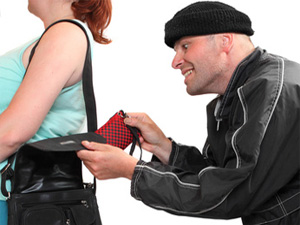 Carry purses, portfolios or briefcases in a manner that will allow you to let go. Straps placed across your shoulder, around your neck or wrapped around your waist have caused injuries because women could not free themselves during a purse snatch.
Carry purses, portfolios or briefcases in a manner that will allow you to let go. Straps placed across your shoulder, around your neck or wrapped around your waist have caused injuries because women could not free themselves during a purse snatch.
Always be aware of your surroundings and carry your pocketbook clasp toward you, close to your body, tucked in the bend of your elbow as if it were a football. If there is a long strap, wrap it around the bag.
If someone attempts to snatch your pocket book, let go of it, especially if there is a weapon involved. When dining out, the only place for your purse should be your lap. The back of a chair is an easy target for a thief. Never carry a wallet in a rear pocket; use a front trouser or an inside coat pocket.
Be particularly aware of your purse/wallet in crowded situations, such as rush-hour trains and buses. If you are jostled in a crowd, be aware that a pickpocket might be responsible. Beware of arguments or commotions designed to distract you while your pocket or purse is being picked.
Minimize the amount of money, credit cards and valuables you carry by only taking items that are necessary for the day. Divide money between your purse/wallet and pockets. Carry your keys on your person separate from your identification.

